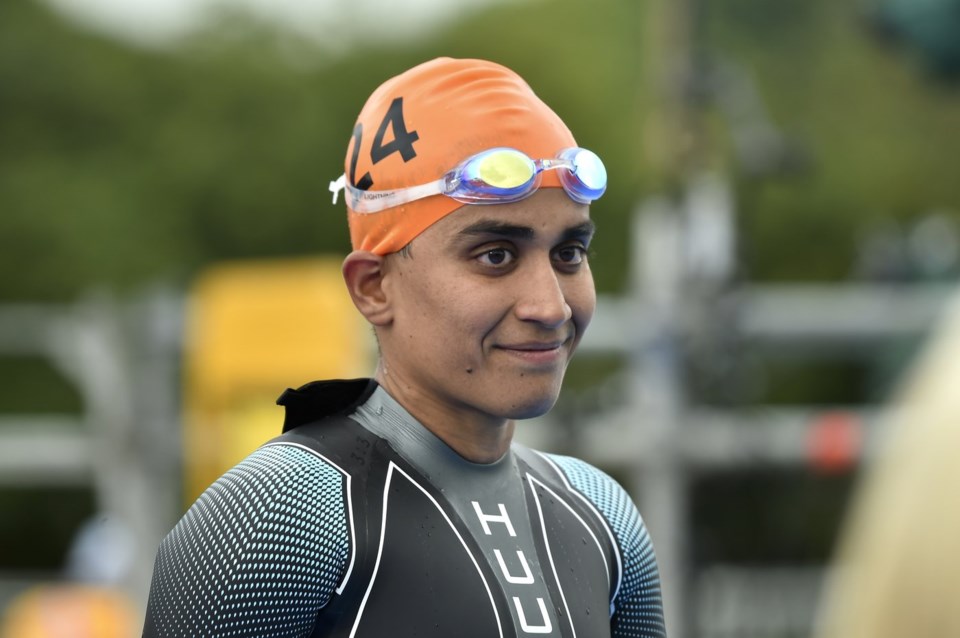BAKU, Azerbaijan (AP) — Pragnya Mohan has been a professional triathlete for nearly a decade, but summers in her native India are now so hot that she can’t train there anymore. She escaped the heat to train in the United Kingdom, but worries about a day when a warming world kills her sport entirely.
American discus thrower Sam Mattis described temperatures as high as 44 Celsius (111 Fahrenheit) at the in Eugene, Oregon, causing some fans, officials and athletes to pass out. And New Zealand soccer player Katie Rood recalled training in heat chambers to prepare for , and warmups cut short in .
All three spoke at the United Nations climate summit in Baku, Azerbaijan to talk about to them, to fans and to sport itself. With billions of fans worldwide, they're among athletes and leagues trying to get more people to care, and act, on climate change.
“In the future, if climate change is not addressed and is not thoughtfully handled, triathlons can cease to exist,” Mohan said at a panel discussion.
It's not all about heat. Mohan noted this year's had to delay some triathlon events because heavy rains — which have increased as a warming atmosphere holds more water — in the Seine River.
Some top soccer clubs have gotten together in a climate action alliance aimed at reducing emissions and inspiring fans to act on climate change. One of those is La Liga club Real Betis. Rafael Muela Pastor, general manager of the club's foundation, said at another panel in Baku that soccer is “the most powerful and massive sport in the world” and it's crucial that “we have to do something.”
“We have a super power and we have a responsibility with that,” he said.
Leslie Mabon, a lecturer on environmental systems at the United Kingdom's Open University, said athletes can raise awareness on issues like global warming, but the most transformative activism often comes from elsewhere.
“I do think athletes can move the needle, but sometimes it’s away from the very highest levels,” said Mabon. “The financial implications of what’s at stake do make it very difficult, and particularly the governing bodies — the leagues, the FIFAs of this world — it’s very hard to get them to take action.”
FIFA — the governing body for world soccer — was unmoved by concerns about heat and human rights in holding the 2022 World Cup in , a country criticized for its treatment of migrant workers, among other issues. And at times, outwardly positive actions from sports leaders can be little more than greenwashing.
FIFA President Gianni Infantino COP29 and posted on Instagram about extending a partnership with 91Ô´´ Island nations to foster “climate-resilient football development” and raise awareness about climate change. That came just months after FIFA signed a with Saudi Arabia's state oil giant Aramco.
Women soccer players from around the world signed an open urging FIFA to end the deal, citing both the country's record on the rights of women and LGBTQ+ people and the impact of fossil fuel production on climate change.
FIFA did not immediately respond to a request for comment from The Associated Press.
“It’s very hard for anything that comes from the top levels to be taken seriously or to be taken credibly when you still have these kind of deals in place,” Mabon said.
Climate change is also making sports more expensive and widening disparities. Jessica Murfree, assistant professor of sport administration at the University of North Carolina, said athletes will have to travel farther and spend more to train and compete as some places become incompatible with sport because it's too hot or there isn't enough snow.
“That’s going to have a massive impact on athletes and athlete hopefuls,” she said. “It drives a bigger socioeconomic wedge between the haves and the have-nots, which then becomes a justice issue.”
Sports are seeking to adapt to a hotter planet. Sometimes competitions get moved to different places, or starting times get shifted to cooler parts of the day. Then there's technology: Qatar spent billions to air-condition stadiums at its World Cup to keep fans and players cool.
But sports can't air-condition its way out of the climate crisis, said Rood, the New Zealand soccer player.
The energy it requires “is a huge cost to the environment," she said in an interview, adding: "It’s not just the isolated events that happen once or twice a year. It’s the training and the lead-up ... those conditions can’t necessarily be created every time.”
And that's concerning for Tina Muir, a former elite runner from the United Kingdom who talks about the threat of climate change through the business she founded, Running for Real. Athletes are conditioned to push themselves beyond their limits, she said.
“It's going to be almost like a war of attrition for many athletes,” Muir said. “It's who can handle these tough conditions the most. ... but also becomes a bit of a safety game, being able to tough it out but doing long-term damage to yourself in the process.”
___
Pineda reported from Los Angeles.
___
The Associated Press receives support from the Walton Family Foundation for coverage of water and environmental policy. The AP is solely responsible for all content. For all of AP’s environmental coverage, visit .
Dorany Pineda And Michael Phillis, The Associated Press



